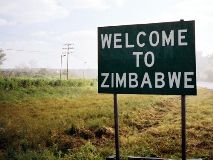Struggling to be heard
 Despite the dangers, Zimbabweans are still managing to spread a democratic message through the media, writes
Despite the dangers, Zimbabweans are still managing to spread a democratic message through the media, writes
Farai Maguwu
(more…)
 Despite the dangers, Zimbabweans are still managing to spread a democratic message through the media, writes
Despite the dangers, Zimbabweans are still managing to spread a democratic message through the media, writes
Farai Maguwu
(more…)
The open call for artists & filmmakers closed on 1 July 2008. We received applications from artists & filmmakers from 30 countries, and we thank all organisations and persons who have assisted us in distributing our open call around the world.
We are currently in the process of selecting artists & filmmakers to participate in the 2009 dialogues, and will announce and introduce the artist pairs as and when they are all confirmed.
Curated by Breda Beban, imagine art after is a multi-stage project for internet, gallery & broadcast that brings together artists and filmmakers who made a home in London with those who stayed in their country of origin.
For its second edition, imagine art after is looking for artists and filmmakers from the following places, who either live there, or in London.
Afghanistan | Albania | Algeria | Angola | Bangladesh | Cameroon | China | Colombia | Democratic Republic of the Congo | Eritrea | Ethiopia | Former USSR | Gambia | Ghana | India | Iran | Iraq | Ivory Coast | Jamaica | Kenya | Libya | Nigeria | Pakistan | Palestinian Authority | Romania | Serbia | Sierra Leone | Somalia | Sri Lanka | Sudan | Syria | Turkey | Uganda | Vietnam | Zimbabwe
Click here for application pack
For more information and an application pack, go to www.imagineartafter.net, or email [email protected]
DEADLINE 1 JUNE 2008
Bridging the gap between the monitoring of abuse and effective advocacy for change through facilitation, research, publication, advocacy and new commissioned works.
Index on Censorship is internationally renowned for bringing leading thinkers from the creative communities to tackle the key issues of free expression, as the practitioners most often affected by censorship and most often least protected.
At the same time Index is respected for its rigorous documentation of free expression rights abuses, in partnership with free speech groups in some of the world’s most complex and dangerous regions. This unique combination of research skill and literary intelligence underpins 36 years of effective, timely and valued contributions to the free expression debate. It makes Index simply more accessible, relevant and authoritative on the issues than most media and think tanks.

UNFINISHED BUSINESS
Chris Ames: There are still questions to answer on the notorious Iraq dossier
CYCLE OF FEAR
Beatrice Mtetwa: The campaign of harassment in Zimbabwe is at its height
ART WARS
Ruben Andersson: Indian nationalists are no fans of the modern art scene
THE AUTHORISED VERSION
Amira Hass: The realities of occupation don’t make the Isreali headlines
FALSE HOPES
Mouwaffaq Al Rifa’i: The Iraqi press faces intimidation and violence
MR MOHAMMADI’S SMILE
Maziar Bahari: An invitation to tea with Iranian intelligence
LOST IN PROCESS
Amr Gharbeia: Egyptian bloggers are under attack
Martin Rowsom – Stripsearch
BACK TO BASICS
Malu Halasa: The future is in lingerie
WALKING THE TIGHTROPE
Safwat Al Kahlout: Journalists in Gaza have to dodge more than crossfire
NOTHING BUT THE TRUTH
Hengameh Golestan: The life of photojournalist Kaveh Golestan
WITNESS TO REVOLUTION
Kaveh Golestan: Reflections on censorship in Iran
FORTY YEARS ON
Raja Shehadeh: Ariel Sharon’s map has reshaped the landscape
WRONG PLACE WRONG TIME
Any Worthington: The release of documents has lifted Guantanamo’s veil of secrecy
WHO OWNS KNOWLEDGE?
Kenan Malik: The battle between scientific research and cultural identity
DEADLY SILENCE
Helen Epstein: A programme of misguided Aids policy could have been prevented
SCIENCE FICTION
Ashish Ranpura & Daniel Glaser: Scientists speak more than one language
CENSORING THE WORD
Julian Petley: A brief history of censorship
DANCING LESSONS FROM GOD
Dawn Starin: Notes on the press, politics and monkeys in the Gambia
Click here for stockists and subscription details